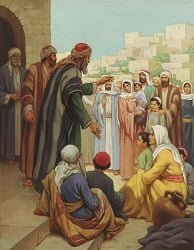Thursday: The Early Explosion
Christ’s earliest disciples energetically advanced the gospel throughout the civilized world. Houses, synagogues, public stadiums, judgment halls, and royal palaces became stages for kingdom proclamation. Jesus, however, prophesied arrests, trials, and hostile royal audiences for those disciples (Matt. 10:16-20). Unfortunately, those saturated with earthly power were slowest to receive Christ.
Read through as much of Acts 4:1-12; 13:5-12, 50; 23:1-6; 25:23-26:28 as you can. Though one can get the idea that so many people were instantly converted out of nowhere, that’s not what happened. These dramatic results were the visible product of underlying circumstances. Seedtime precedes harvest. Christ had faithfully proclaimed the gospel. Missionaries had witnessed throughout Judea. Early converts no doubt helped to carry the message. When Christ personally conquered death, confirming His message, thousands of fence-sitters leaped into the kingdom. They had secretly followed Him. Their hearts had responded to His invitations. Cultural factors, job security, and family pressure had slowed their overt response. Christ’s resurrection destroyed the fence, forcing a decision.
Then, of course, the apostle Paul entered the picture. His witness, however, was not universally appreciated. Sometimes prominent men and women persecuted and expelled him. He was stoned, flogged, imprisoned, and otherwise mistreated-often at the instigation of powerful people. Political motives were frequently the foundation for their anti-Christian sentiments.
Governor Felix imprisoned Paul in order to placate religious opposition to Paul. His successor, Festus, was more fair-minded, but lacked the political willpower to release Paul. During an official visit King Agrippa and his sister, Bernice (descendants of Herod’s dynasty), requested an audience with Paul. Unfortunately, like their ancestors before them, they rejected his invitation to salvation. Although facing similar rejection and persecution, Christ’s twenty-first-century disciples must likewise persevere.
How can disciple-makers working among worldly and religious authorities avoid the discouragement of frequent rejection? Whenever Christ’s followers labor for powerful people, who else might be affected by their witnessing?


It’s hard to share Jesus with the rich, but our Lord who never gave up on rich because He also died for them. And like His disciples who laboured to share Jesus, did all what they had to do, so we have to carry on the work that our God gave us to do and that is sharing Jesus to them. We sow and Jesus waters the soil.
Daily I am realizing that the same Holy Spirit who is working with me is the same Holy Spirit who will work with the rich. Many people now are studying their way into the church without anyone inviting them, visiting them, or studying with them. Many are coming to the Sabbath truth by studying the bible and the Holy Spirit is interpreting it to them. But we still have to do our part. Some of us have one talent some have two and more, what some can do, some can’t. Therefore those of us who work or come in contact with the rich should use every opportunity to do witnessing.
Matthew 24:14 states,”” And this gospel of the kingdom will be preached in the whole world as a testimony to all nations, and then shall the end come” May our lives be in accordance with the readiness to proclaim to the world as witnesses for Jesus, also be ready for next ”gospel explosion”. Great men and women will be converted by the power of the Holy Spirit, as we continue to pray for them.